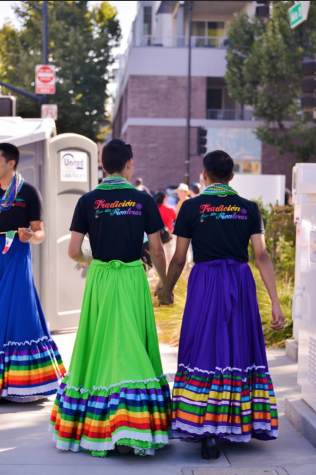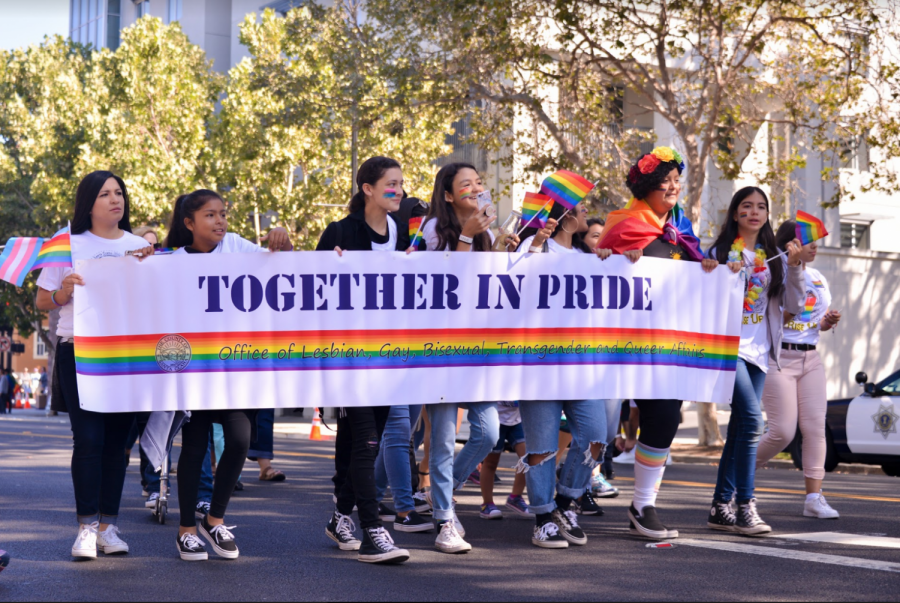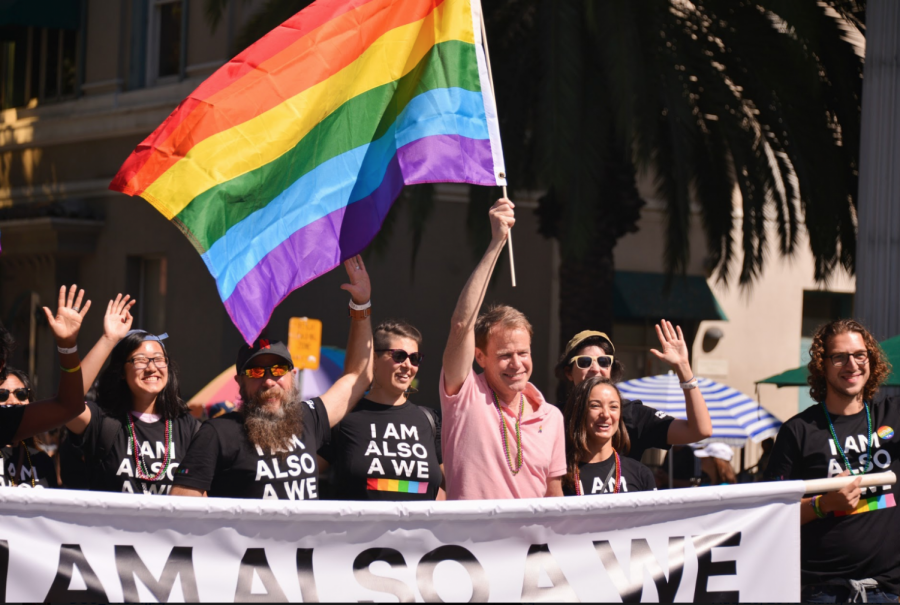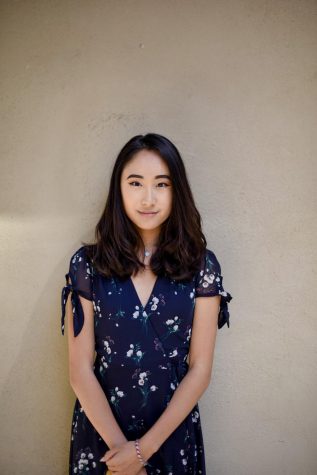Pulse of the People: Bay Area Pride parades highlight love, support
Student marchers representing the Office of LBTQ+ rights carry a festive banner in honor of Pride.
September 1, 2018
Crimson crosses over to tangerine, meeting sunny yellow then lime then azure before finally merging with violet. These colors form a common variation of artist Gilbert Baker’s rainbow flag, created in 1978 to represent gay pride and the LGBTQ+ community.
The Stonewall Riots started after the police raided the Stonewall Inn, one of the only bars that was welcoming to the LGBTQ+ community, in New York City on June 28, 1969. These protests sparked the start of the gay rights movement across the nation. In honor of the Stonewall Riots, June was eventually labeled Pride Month.
Now, Pride parades are widespread across the Bay Area. The most recent parade in the Bay Area was the Silicon Valley Pride parade, which took place last Sunday.
On the day before the parade was a Trans and Friends Rally, the first Silicon Valley Pride rally to specifically commemorate the Trans and Non-Binary community. Following the rally was the Night Festival “Fantasy,” where people dressed in costumes related to four themes: the Enchanted Forest, Under the Sea, Good versus Evil and Space Odyssey.

Two performers join hands as they stroll around the Silicon Valley Pride celebration grounds.
On Sunday morning, the Pride parade followed along North Market Street from East Julian Street to East San Fernando Street. Subsequently was a festival with a main stage; the Hey Girl area with beauty stations and vendors; a space for video games, virtual reality and other tech products; and food trucks.
“[This is the] first year we’re pulling out the Trans Rally, and this is our first year having a female-focused area,” said Saldy Suriben, Chief Marketing Officer of the Silicon Valley Pride parade. “This year we’re more inclusive, and [the community] pointed out that there should be more trans and female presence at the festival so that it’s not an all male-centered festival.”
Silicon Valley Pride was just one of several Pride parades during the summer. The San Francisco Pride Parade took place on June 24, during Pride Month, with participants parading along Market Street from Embarcadero to Civic Center. Celebrations and rallies took place on both June 23 and June 24 and included presentations by performers, speakers and contributors, as well as community stages aimed toward more specific demographics, such as the Deaf & Hard-of-hearing Gathering Space and the Asian & Pacific Islander Community Pride Stage & Pavilion.
The San Francisco Pride parade had attracted over 50,000 marchers, many of whom were students.
“As a member of the [LGBTQ+] community and as a person with a lot of friends who are members of the community, it’s just cool to have that solidarity,” sophomore Sarah Raymond, who attended the San Francisco Pride parade, said. “It sounds kind of corny, but being able to just go and hang out and wear your giant rainbow boa and not be afraid of people judging you, it’s really fun. It’s a liberating experience.”
Beyond their colorful festive atmosphere, Pride parades demonstrate the expansive support for the LGBTQ+ community and can make a powerful statement of its existence in today’s society.
“I think the pride events are a great fun public celebration, but it’s also a way and a time for the LGBTQ community to come together and highlight the diversity within the community, to highlight all the progress that’s been made but also remind people of the work that still needs to be done,” Amy Lanteigne, Management Analyst of the Santa Clara Office of LGBTQ Affairs, said. “I think having a fun celebratory atmosphere is great to bring folks in and start those conversations with them.”
Recently, LGBTQ+ activists have campaigned against President Trump’s Supreme Court nomination, Brett Kavanaugh. Many LGBTQ+ activists say that Kavanaugh, a conservative judge, will be a threat to the human rights of the LGBTQ+ community, especially since he would be replacing former Supreme Court Justice Anthony Kennedy, who had played a major role in legalizing same sex marriage and supporting other LGBTQ+ issues in the past.
This piece was originally published in the pages of The Winged Post on Aug. 31, 2018.


















![“[Building nerf blasters] became this outlet of creativity for me that hasn't been matched by anything else. The process [of] making a build complete to your desire is such a painstakingly difficult process, but I've had to learn from [the skills needed from] soldering to proper painting. There's so many different options for everything, if you think about it, it exists. The best part is [that] if it doesn't exist, you can build it yourself," Ishaan Parate said.](https://harkeraquila.com/wp-content/uploads/2022/08/DSC_8149-900x604.jpg)




![“When I came into high school, I was ready to be a follower. But DECA was a game changer for me. It helped me overcome my fear of public speaking, and it's played such a major role in who I've become today. To be able to successfully lead a chapter of 150 students, an officer team and be one of the upperclassmen I once really admired is something I'm [really] proud of,” Anvitha Tummala ('21) said.](https://harkeraquila.com/wp-content/uploads/2021/07/Screen-Shot-2021-07-25-at-9.50.05-AM-900x594.png)







![“I think getting up in the morning and having a sense of purpose [is exciting]. I think without a certain amount of drive, life is kind of obsolete and mundane, and I think having that every single day is what makes each day unique and kind of makes life exciting,” Neymika Jain (12) said.](https://harkeraquila.com/wp-content/uploads/2017/06/Screen-Shot-2017-06-03-at-4.54.16-PM.png)








![“My slogan is ‘slow feet, don’t eat, and I’m hungry.’ You need to run fast to get where you are–you aren't going to get those championships if you aren't fast,” Angel Cervantes (12) said. “I want to do well in school on my tests and in track and win championships for my team. I live by that, [and] I can do that anywhere: in the classroom or on the field.”](https://harkeraquila.com/wp-content/uploads/2018/06/DSC5146-900x601.jpg)
![“[Volleyball has] taught me how to fall correctly, and another thing it taught is that you don’t have to be the best at something to be good at it. If you just hit the ball in a smart way, then it still scores points and you’re good at it. You could be a background player and still make a much bigger impact on the team than you would think,” Anya Gert (’20) said.](https://harkeraquila.com/wp-content/uploads/2020/06/AnnaGert_JinTuan_HoHPhotoEdited-600x900.jpeg)

![“I'm not nearly there yet, but [my confidence has] definitely been getting better since I was pretty shy and timid coming into Harker my freshman year. I know that there's a lot of people that are really confident in what they do, and I really admire them. Everyone's so driven and that has really pushed me to kind of try to find my own place in high school and be more confident,” Alyssa Huang (’20) said.](https://harkeraquila.com/wp-content/uploads/2020/06/AlyssaHuang_EmilyChen_HoHPhoto-900x749.jpeg)








